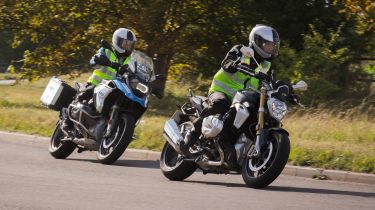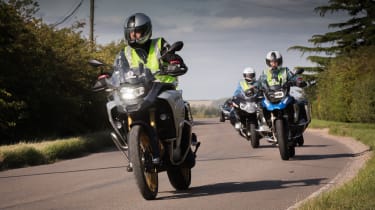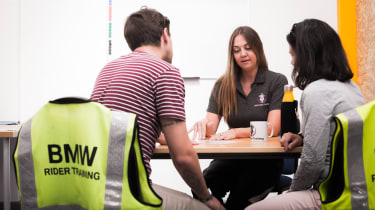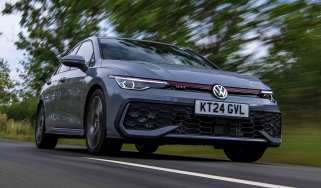Advanced motorcycle training: IAM RoadSmart, RoSPA and Enhanced Rider Schemes explained
Advanced motorcycle training can help you become a better, safer rider and save you money on your insurance

Whether you’ve just got your motorcycle licence or are a seasoned rider with decades of experience, you can enhance your riding skills further by doing some advanced rider training. But what is advanced motorcycle training? We look at the different advanced riding options available to qualified motorcyclists of all levels.
There are different types of motorcycle riding courses available to suit most riders and riding styles. You can take courses to learn how to ride a motorcycle off-road, how to go around a race circuit as fast as possible, or what to do if you arrive at the scene of a motorcycle accident. Here, we’re focusing specifically on training course that will help you become a safer and more confident rider on the road.
There are a number of additional benefits of advanced motorcycle training, other than enhancing your existing road-riding skills and knowledge. Those who have advanced motorcycle training qualifications could also see a fair amount of money shaved off their bike insurance premiums.
In the UK there are multiple organisations that offer different certifications, which each cost a different amount and require slightly different assessments. Here are the top examples:
BikeSafe
BikeSafe is a motorcycle safety initiative run by the police in the UK. A total of 36 police forces across the country offer the course at 100 different workshop venues, which aims to cover rider attitude, collision causation, cornering, positioning, overtaking and hazard perception, among other topics.
At the time of writing, a BikeSafe workshop costs £84 and includes discussions on hazard awareness and how to make your motorcycling safer, followed in most cases, by an assessed ride on the road.
You’ll then receive feedback on your strengths and weaknesses from the BikeSafe assessor, who “will provide honest feedback in our review, as we believe that provides the greatest benefit to the rider.”
These workshops can also act as a kind of stepping stone into advanced rider training, with BikeSafe themselves recommending riders undertake further training once completing one of their assessments.

IAM RoadSmart
IAM RoadSmart, formerly known as the Institute of Advanced Motorists, offers an Advanced Rider course that’s designed to develop your core riding skills and teach you how to apply its ‘IPSGA’ framework (Information, Position, Speed, Gear and Acceleration) in a variety of situations.
Once you’ve booked your course, you’re paired with a local IAM RoadSmart bike group and one of its expert observers who will accompany you on several rides in your local area and identify areas of improvement. You’ll typically complete 6-12 of these sessions with your observer during the course, with time in between to practise and improve your skills.
Once your observer feels you’re ready, they will put you forward for the advanced rider test, which is carried out by one of the organisation’s examiners and includes around 60 minutes of on-road riding. Once you pass, you’ll receive your Advanced Rider certificate and ‘IAM RoadSmart Member’ status.
IAM RoadSmart’s Advanced Rider course costs £219 and includes membership to one of its local bike groups, the cost of the advanced test itself and one year’s membership to IAM RoadSmart as an Associate. You may also be asked to contribute to the fuel costs of your observer, as they are volunteers after all.
Royal Society for the Prevention of Accidents (RoSPA)
The RoSPA offers a four-day Advanced Motorcycle Training course that prepares riders for the organisation’s Advanced Motorcycle Test.
The RoSPA Advanced Motorcycle Test has a unique grading system, when compared to programmes like IAM RoadSmart. Rather than a simple pass or fail, it’s graded as bronze, silver and gold.
The Advanced Riding Test, which the RoSPA says is “the most comprehensive and challenging available to the public”, lasts around 45 to 60 minutes, and is taken with a RoSPA Examiner, all of whom are either serving or retired UK police officers.
In order to obtain a high grade, riders will need a good knowledge of The Highway Code and Motorcycle Roadcraft, otherwise known as the Police Rider’s Handbook.

British Motorcyclists Federation (BMF)
The BMF’s Blue Riband course “seeks to encourage you to THINK about why?, and what? you are doing when you are riding, to be self-critical, and to be able to recognise your own strengths and weaknesses.”
The standard course begins with a theory session and discussion about the various techniques you will practise, followed by practical sessions booked for when is convenient for you and your instructor.
The condensed course is held over just a day and a half, and includes the same classroom-based theory session, followed by a full day’s riding broken into sections with numerous stops for debriefs with your instructor. Once you’ve reached the required standard, you’ll take the Blue Riband assessment.
The assessment (which is conducted by another instructor) takes about an hour. At the end, you’ll receive a written report on your performance, including comments on your control of the motorcycle, information gathering, psychology, judgement and road craft.
The concentrated course costs £250 and includes the cost of the assessment. The standard course will depend on how quickly you progress, but should cost about the same with the assessment itself costing an extra £80.
Enhanced Rider Scheme
The Enhanced Rider Scheme (ERS) is the Driver and Vehicle Standards Agency’s (DVSA) own motorcycle training course that’s ideal for riders who have just passed their test or are getting back into the saddle after a break. It’s also a great option if you’re upgrading to a more powerful motorcycle, or just want to check your riding standard.
The ERS begins with a rider assessment with an expert trainer, which will involve riding together on different road types and in varying traffic conditions. For most people, this initial assessment lasts around 1 to 2 hours. There’s no test, just the assessment carried out by your trainer.
Once you successfully complete the scheme, you’ll be awarded the ‘DVSA Certificate of Competence’.
After you have your DVSA certificate of competence, you can also sign up for extra training modules including modules on delivery or courier riding, group riding, and Biker Down and accident scene management. The cost of the ERS depends on the trainer you go with and the amount of training you require.
Is advanced motorcycle training worth it?
Advanced motorcycle training is worth considering for every rider who wants to improve their motorcycle riding skills and become a better biker.
Not only can you develop and enhance the skills you already have, but there are plenty of helpful hints and tricks you can pick up which could help keep you safer on the road.
Besides, even if you pick up just one new technique that helps you avoid an accident then advanced motorcycle training will be worth every penny.
You could save some money when you renew your bike insurance, too. Many insurance providers offer discounts for those who have additional riding qualifications.
Get even more from Auto Express, follow our channels...





